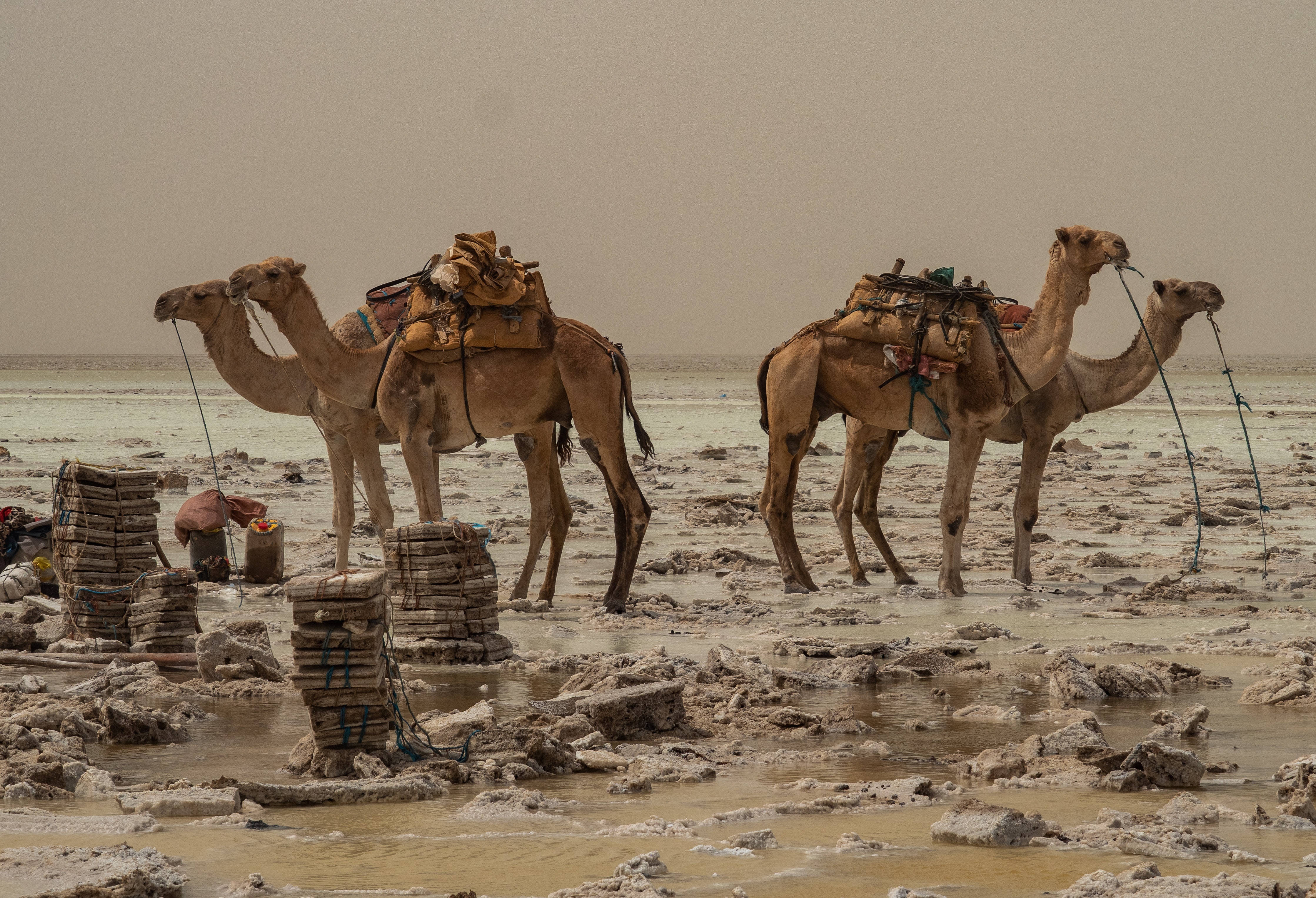Nurish Camel Express
The Nurish Camel Express is a camel train that operates between Rooks and Kings, on the Amnari Amin Duum border, and the Nurish communities on the Long Sea Coast. The Express runs four times a year between Bat Nur on the Long Sea Coast to the Rooks and Kings Depot and associated clinic, carrying goods and passengers from each. Each journey takes between one and two months, depending on the climate and the route taken. The Nurish Camel Express is the only regular means of transport between the River Duma on the western side of the Eastern Desert, and the Long Sea Coast in the east.
Composition
There are in fact six regular “Express” camel trains, each one tied to a specific route (see below). Each Express is composed of two to four files, each of which contains up to twenty Nurian Camels. Known for their ability to withstand extremely harsh conditions, they have long been favoured for carrying goods, cargo, and passengers between settlements on various routes through the Eastern Desert. Each file is staffed by a puller, leading the camels at the front, at least six guards to protect against bandits and raiders, two cooks (a chief and assistant), and young members of the pullers’ families, conducting training. Young camels are carried on the backs of their mothers, or at the back of the file. Each Express has a manager upon whom falls the duty of organising arrivals and departures, dealing with problems, and arranging deals with prospective passengers. A navigator and scout are also essential staff for ensuring a safe route through the desert. Finally, a super-cargo at each end is responsible for managing goods and passengers to ensure trade handovers are swift and efficient.Organisation
Each “Express” is run by an incorporated group of Nurish clans, operating together to provide all the staff for the train from one end of the route to the other. They refer to themselves as companies, although they are usually made up of large extended family groups, all of whom share the ownership of the camels, the equipment, and caravanserai at each trading point along the route. Companies specialise in particular routes, due to the specialist knowledge required in order to navigate different types of desert terrain. For example, some companies have taken it upon themselves to focus on salt trading between the Salt Sea and the Long Sea Coast, which is especially difficult given the alkaline storms in the former. Part of a file, Salt Sea, Northern Caish Nur (Photo by Lesly Derksen on Unsplash)History
The Nurish are long-standing residents of the Lower Caish Nur, Caish Nur, and Long Sea Coast. Their own legends place their history amongst the first peoples recorded as living in the Eastern Desert, including the Keshwar Empire and the Ancient Anther. However, they consider themselves an entirely separate race, not belonging to any of the cultures or ethnicities of those periods. The establishment of the Express and its history are similarly murky. It is likely that camel trains ran between various trade routes out of the Keshwar Empire, and may even have been a constituent of trading as far back as the Anther. Depictions of camel trains have been found on ruins in the Eastern Desert which would support this theory. It is generally believed that the Nurish were present at the one of the earliest points when the First Five Tribes requested assistance in order to defend the Gaps. The Nurish themselves, who maintain strong relationships with Amin Duum and restock various outposts, maintain that their ancestors did not refuse to fight, but only suggested since their skills lay in logistics and supply, the Five Tribes would be better served by having the Nurish support them in a non-military capacity. The Nurish point to the very long history of the Nurish Express as evidence to support this notion. It is forbidden for any Amnari on their Bala to make any use of the Express, and the Nurish fully support and take great pains to insist that they have never allowed a student to take advantage of the camel train while out in the desert.Caravanserai
Each route is facilitated by a number of caravanserai. All Nurish staff are familiar with surviving in the harsh environment of the Eastern Desert, and with the care and feeding of their camels. Caravanserai are specific to each company, although in the hottest and most difficult terrain, it is known for those living in outposts to assist trains from other companies. The structure of the caravanserai is dependent on its location and surrounding environment. The largest encampments are found around the semi-permanent oases of the Field of the Red Queen in the west and the Wadi Urga in the east. Encampments in the Gritlands, the dune sea of the deep desert, and the Salt Sea, tend to be smaller and more isolated, shifting location depending on wind location, direction, and the presence or absence of water.Armor and defense
Each Express has at least six guards, although this depends on the time of year and the area through which the train travels. Guards are the only members of the contingent who are often not of Nurish descent, owing to the Nurish themselves having a deep and longstanding hatred of conflict. Guards are generally armed with whatever they bring with them, which usually means crossbows, long and short bows, and a range of bladed weapons. Guards occasionally travel by horse, separate to the Express itself, but this is rare, on account of horses being generally unsuited to the desert terrain.
Communication Tools & Systems
The Expresses spend long periods out of contact with any other civilisations or groups. As they are also operating outside of Amnari Bubbles, they also do not have access to slates or similar technologies. Younger members of the clans or company are frequently kept on hand solely for the purpose of travelling ahead to the next caravanserai in event of attack or to relay news. One of the roles of the Express is to carry messages along with cargo and people, ensuring that those who inhabit the deep desert are provided with news and contact with the outside world.
Sensors
The Express trains make use of scouts to track terrain and weather ahead, and navigators to guide the train. Each are specialist roles requiring a high degree of training. Navigators and scouts are therefore in high demand and those who grow up or live in Nurish outposts are able to command a high price for their work.
Nickname
Eastern Desert Express, Camel Hair Express
Creation Date
Unknown (Era of the Five Empires or earlier)
Owning Organization
Current location




Comments